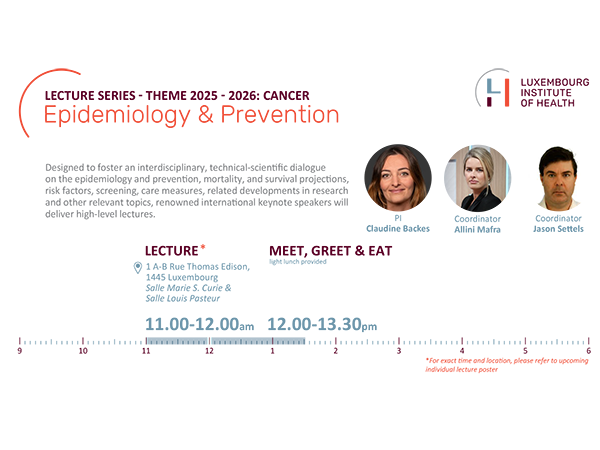🇬🇧 Respiratory viruses and chronic inflammation
- Lecture Series Infection & Immunity
Speakers

Skevaki
Professor (W2); Campus Lead, Institute of Laboratory Medicine and Pathobiochemistry, UKGM Campus Gießen and Research Group Leader Institute of Laboratory Medicine and Pathobiochemistry, Faculty of Medicine,
Philipps-University Marburg
Abstract
Asthma is a chronic airway disorder, which has acquired the dimension of a pandemic in modern times and currently affects over 300 million people worldwide. We know that one of the prevailing hypotheses to explain the sharp increase in global asthma prevalence is the one which focuses on the lack of immunological tolerance. We previously demonstrated influenza virus-induced T memory cell-mediated heterologous immunity against allergens and protection from experimental asthma. Since then, we observed that other epidemiologically relevant respiratory viruses may have similar effects. What is more to add, for people with already established asthma the vast majority of exacerbations are preceded by an upper respiratory tract infection which is commonly caused by respiratory viruses.
In the case of SARS-CoV-2, we postulated that people with T2-type of asthma may have a lower risk for becoming infected with the virus based on our own virus/allergen cross-reactivity data but also due to other mechanisms. Biomarkers for endotyping asthma are quite useful for supporting the prognosis and management of such patients, as well as for prioritization in the context of public health strategies such as immunization. Reported differences regarding the risk of people with asthma when it comes to COVID-19, may reflect differences in population characteristics and associated biases involved in these studies.
We have previously identified a high prevalence of autoantibodies among hospitalized COVID-19 patients in the university hospitals of Marburg (Germany), Pennsylvania and Stanford (USA). In several cases, such autoantibodies were of new onset as they developed de novo during hospitalization of these patients. In our follow up work, we showed that anti-cytokine antibodies are highly prevalent also among hospitalized intensive care unit patients, albeit prevalence was higher among those with documented infections as compared with those that did not have a reported infection. Autoantibodies in the context of infections may have potential benefits such as providing negative feedback on cytokines and therefore preventing a cytokine storm. Of course, negative consequences such as inhibition of adequate immune response to infection may also be the case.
Respiratory viruses are also responsible for the majority of acute COPD exacerbations and cellular immunity is vital in this regard. T cell activation and effector function is highly dependent on mitochondrial function. Our data show that inhibition of mitochondrial ROS may be an effective strategy for attenuation of smoke-induced hyperinflammation without compromising antiviral immunity.
*Please note that registration is mandatory by sending an email to carole.weis@lih.lu or michelle.roderes@lih.lu.
LOCATION
House of BioHealth
Conference Room (ground floor 0)
29, rue Henri Koch, L-4354 Esch-sur-Alzette
LECTURE: 11:00am – 12:00pm
MEET & EAT
12:30pm – 2:00pm
House of BioHealth
Salle Françoise Barré Sinoussi
29, rue Henri Koch, L-4354 Esch-sur-Alzette
Light lunch provided – Registration mandatory*
Supported by:

DATA PRIVACY
Read more about the “Data Protection Notice: processing of personal data in the scope of events’ management”.



